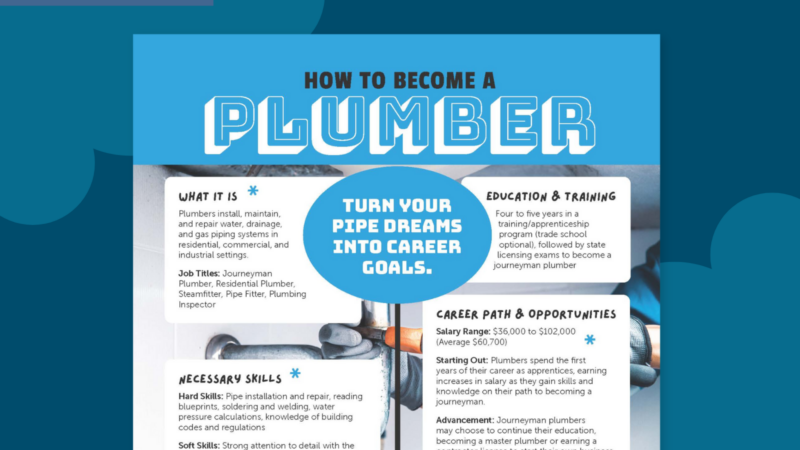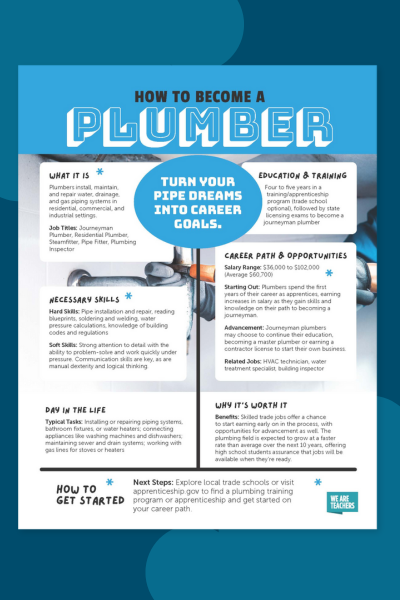Skilled trade jobs are perfect for people who love working with their hands, solving problems in real-world situations on a daily basis. A career in plumbing offers good pay and strong job security, without the need to attend a four-year college. Here’s how to become a plumber, plus insights and advice from a real worker in the trade.
Dan Quinonez is the executive director of the PHCC Educational Foundation, which offers programs to plumbers at every level of the profession. “We know that college isn’t for everyone, so we’re seeing more high schoolers today looking to take an alternative career path, especially with tuition costs for a four-year degree going up and job stability becoming major concerns,” he shares.
“With so many plumbers retiring and fewer people replacing them, there is a dire need to find skilled workers who can fill the pipeline and meet the growing demand. What other industry offers a young person in their teens or early twenties the opportunity to learn a skilled trade right out of high school and receive on-the-job training, while making good money, having job flexibility, and an easy entry point into the workforce? The plumbing, heating, and cooling industry isn’t going away anytime soon—it’s only going to continue to evolve and get more advanced, opening doors for tech-savvy individuals who are looking to make a difference in the world.”
How To Become a Plumber FAQs
What is a plumber?
Plumbers install, maintain, and repair water, drainage, and gas piping systems in residential, commercial, and industrial settings. Plumber job titles include:
- Journeyman Plumber
- Residential Plumber
- Steamfitter
- Pipe Fitter
- Plumbing Inspector
On a typical day, plumbers may spend their time installing or repairing piping systems, bathroom fixtures, or water heaters. They may also connect appliances like washing machines and dishwashers, maintain sewer and drain systems, or work with gas lines for stoves or heaters. They often work on construction sites, homes, and industrial facilities.
Why become a plumber?
Plumbing jobs, like many other skilled trades, are always in high demand, and their earning potential is terrific. The average pay rate is about $30/hour (around $60,000 per year), but experienced plumbers often make much more, up to $50 an hour in some cases. (Salary figures are per Indeed.com as of March 2025.)
“Plumbers are in high demand right now because there is an ongoing shortage of skilled laborers in the industry,” explains Quinonez. “It is expected that the U.S. will be short more than half a million plumbers by 2027—that’s a staggering number when you think about how critical this profession is to ensure clean, safe potable water.”
He continues, “I think the one thing that is eye-opening for any young person who might be considering a career in plumbing is how lucrative this job can be. Plumbing professionals can do well financially, as they do not have the burden of college debt, can make good salaries, and have the potential to advance as an estimator, project manager, or even an owner of a company. For some apprentices, their apprenticeship training is paid by their employers as the apprentice draws a salary.”
What does a plumber do?
“People always think a plumber’s job is fixing toilets,” Dan says. “Well, that’s not the only thing they do! It’s so much more than that. The contractors I speak with from the Plumbing-Heating-Cooling Contractors Association share the pride they feel after installing new plumbing systems or repairing faulty pipes, resulting in customers saving significant money on their water bills. And for plumbers working on new construction projects, they are essential for the build from the ground up, including waste/drainpipes, vents, copper pipes; the installation of toilets, sinks, water heaters … the list goes on.”
Dan is also enthusiastic about the vital importance of this career, now and in the future. “Plumbers play a critical role in protecting public health and safety, and the environment, and one day is not always the same as the next. They are looked upon as experts in sustainability, energy efficiency, and water infrastructure. With technology advancing as quickly as it has over the last few years, plumbers and HVAC technicians can learn how to use, install, maintain, and troubleshoot new smart technologies and sustainable solutions to meet the needs and challenges of this rapidly changing industry.”
What are the necessary skills for a plumber?
According to Dan, “To make it in the plumbing, heating, and cooling industry, you need to be able to analyze and solve problems; use computer, automation, and diagnostic equipment; and have an aptitude for fixing things. Plumbing requires many specific skills to excel on the job site. They include basic math and science; technology; tool knowledge and use; safety awareness; and customer service and soft skills.”
“For those with a high aptitude in science, technology, engineering, and math (STEM), there are a wide range of opportunities to use those skills in the plumbing profession,” Dan emphasizes. “Whether it’s to correctly size pipes or design fluid-handling systems, everything from algebra and geometry to physics, CAD to drafting and blueprint reading, are used in this line of work.”
Not sure if plumbing is the right career for you? Dan invites interested high school students and others to take the free PHCC Academy Workforce Readiness Course. Learn more about the plumbing industry and whether it’s the right career path for you.
Do plumbers need a college degree?
Most plumbers earn a high school diploma or equivalent, then complete special training or an apprenticeship program. In most states, plumbers must pass licensing exams at the end of their training years, after which they become journeyman plumbers.
How long does it take to become a plumber?
On average, it takes about five to six years to become a licensed plumber. But for most of that time, apprentice plumbers are learning on the job while earning a salary!
How To Become a Plumber: An Overview of the Process
Trade or Technical School (Optional)
Some people choose to enroll in a trade or technical school program to start the process of becoming a plumber. These classes teach them technical information they’ll need in their careers, preparing them for a more successful apprenticeship. Trade schools often help prospective plumbers find apprenticeships too, making the process a little easier.
In some districts, high school students can attend career and technical education (CTE) programs as part of earning their high school diploma. When they graduate, they’ll be ready to start their paid apprenticeships, without the need to pay for trade school.
Prospective plumbers can complete formal training courses at home, too, from places like PHCC Academy and other plumbing schools. This is a great option for high school students whose districts don’t offer applicable CTE courses.
Apprenticeship (On-the-Job Training)
Regardless of whether you attend trade school, apprenticeships are required for all new plumbers. It usually takes about four to five years of full-time on-the-job training to become a journeyman plumber. Apprentice plumbers generally earn a salary right from the start, and it increases as they gain skills and knowledge.
Find apprenticeship opportunities at Apprenticeship USA.
Journeyman Licensing Exam
At the end of an apprenticeship, candidates take their state’s licensing exams. (A few states do not license plumbers at the state level; check your state’s requirements for more information.) These exams cover things like plumbing codes and regulations, safety procedures, blueprint reading, and other plumbing skills. After passing these exams, apprentices officially become journeyman plumbers and are licensed to work on their own without supervision.
Professional Development Opportunities
Some people stay at the journeyman level throughout their careers, but others decide to earn higher certifications, becoming master plumbers or earning their contractor license. This allows them to supervise apprentices or journeyman plumbing teams, or design plumbing systems and schematics. Advanced skills like these mean higher salaries, or even the opportunity to open their own plumbing business.
PHCC director Dan Quinonez offers these final thoughts: “For anyone who enjoys working with their hands, plumbing in particular is a smart choice because it offers stable employment, regardless of how the economy is doing, and competitive wages from the start while on a steady trajectory for career growth. And this profession is for everyone! Diverse workers make the plumbing, heating, and cooling industry stronger.”
Don’t forget to grab your free printable How To Become a Plumber poster!










Recent Comments